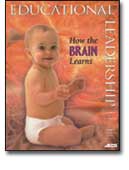ASCD Goes to Mars
Communities on Mars? ASCD is taking an active role in the Mars Millennium Project, sponsored by the National Endowment for the Arts, NASA, the J. Paul Getty Trust, and the United States Department of Education. The goal is to engage students in an exploratory project integrating the arts, science, and technology. ASCD will develop curriculum materials that will be the nucleus of this program to create integrated units, activities, and ideas for teachers across the United States. In the culminating task, students will design a community on Mars in which 100 people could actually live in the year 2030. The Mars Millennium Project is just one of the programs sponsored by the White House Millennium Council to mark the transition from the 20th to the 21st century.
New ASCD Networks
- The Multiage Grouping Network
- The Language Varieties (Pidgins, Creoles, and Other Stigmatized Varieties) Network
- The Differentiated Instruction Network
- The Parenting Education Network
- The Technology in the Middle School Network
Don't forget that ASCD also has a Brain-Based Education/Learning Network, led by Joan Caufield, Director of the Center for the Advancement of Reform in Education at Rockhurst College, and Wayne Jennings, President of Designs for Learning.
If you are interested in any of ASCD's 52 networks, please contact Roger Campbell (email: rcampbel@ascd.org).
The Brain Online
ASCD is producing a new Professional Development Online about the brain. This PD Online will introduce learners to neuroscience, its discoveries, the implications for educators, and the limitations of brain research. The course will provide a survey of the current knowledge about the brain and how it functions. Lessons will include the following topics: the Brain's Role in Life; the Physical Brain; Emotions; Memory; Reasoning, Planning, and Problem Solving; Health; and Classroom Implications. The PD Online will be available this winter.
The Brain and Learning
- New Knowledge and Understanding
- Classroom Applications
- Changing Schools to Reflect New Knowledge
- What Parents Need to Know
The series also includes a facilitator's guide, which contains many activities to help participants apply brain research to the classroom.
For Your Calendar
- 1999: San Francisco, March 6–8
- 2000:New Orleans, March 25–28
- 2001:Boston, March 17–19
- "Differentiating Instruction for Academic Diversity," Philadelphia, Pennsylvania: January 20–22, 1999
- "Problem-Based Learning," Philadelphia, Pennsylvania: January 20–22, 1999
- "Developing Mental Models for Leadership," Philadelphia, Pennsylvania: January 20–22, 1999
- "Developing Performance Assessments that Improve Instruction," Dallas, Texas: February 10–12, 1999
- "Block Scheduling," Dallas, Texas: February 10–12, 1999
- "Effective Leadership for Academic Achievement," Dallas, Texas: February 10–12, 1999
ASCD Resources on "How the Brain Learns"
The following is a partial list of ASCD resources on this topic. For a more complete listing, visit ASCD's Web site or call the ASCD Service Center.
- Teaching with the Brain in Mind(1998). Jensen, E. Price: $17.95 (member); $21.95 (non-member). Stock no. 198019L36.
- Education on the Edge of Possibility(1997). Caine, R. N., & Caine, G. Price: $16.95 (member); $20.95 (non-member). Stock no. 197021L36.
- The Brain, the Mind, and the Classroom(1998). Price: $34.95 (member); $41.95 (non-member). Stock no. 296282L36.
- Translating Brain Research into Educational Practice(1998). Wolfe, P. Price: $39.95 (member); $47.95 (non-member). Stock no. 297154L36.
ASCD's Fall Resources Catalog. The resource catalog is now available. Call1-800-933-ASCD to receive a copy.
